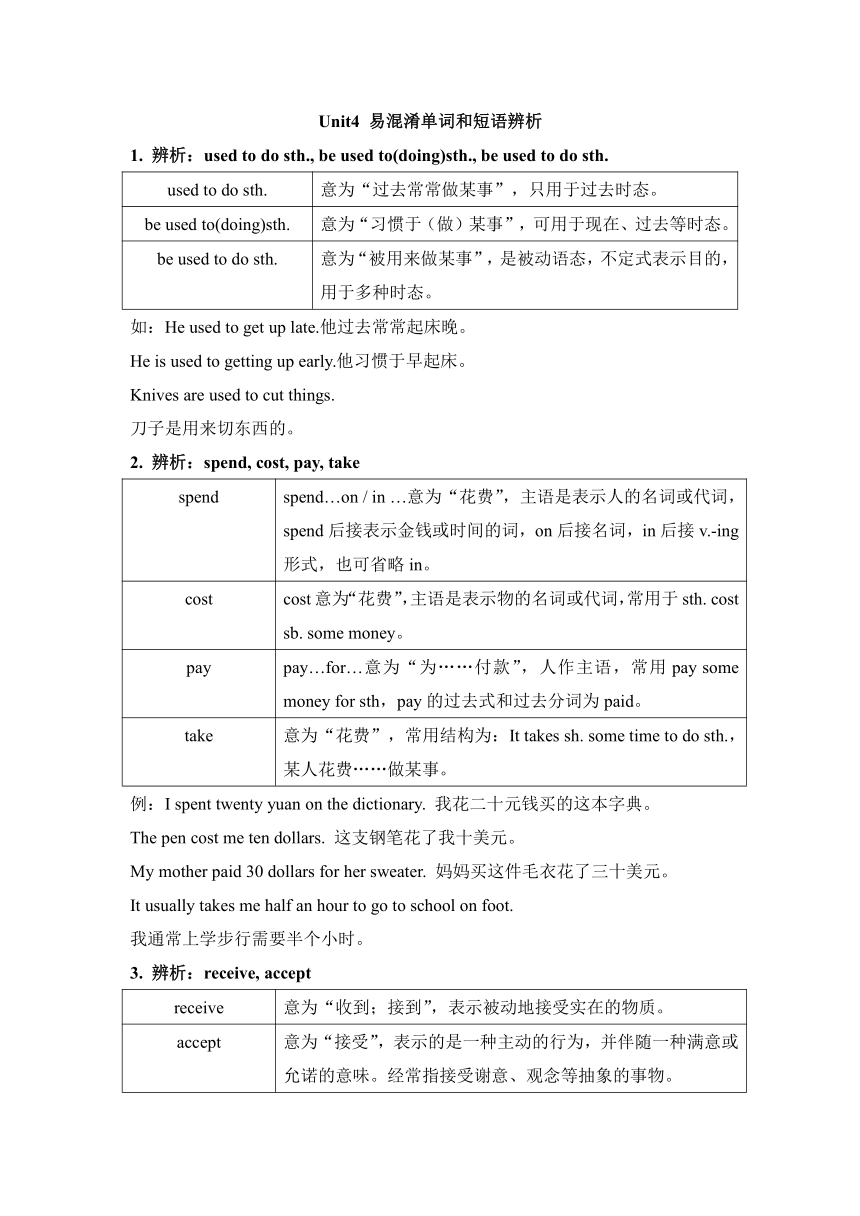
Unit4 易混淆单词和短语辨析 1. 辨析:used to do sth., be used to(doing)sth., be used to do sth. used to do sth. 意为“过去常常做某事”,只用于过去时态。 be used to(doing)sth. 意为“习惯于(做)某事”,可用于现在、过去等时态。 be used to do sth. 意为“被用来做某事”,是被动语态,不定式表示目的,用于多种时态。 如:He used to get up late.他过去常常起床晚。 He is used to getting up early.他习惯于早起床。 Knives are used to cut things. 刀子是用来切东西的。 2. 辨析:spend, cost, pay, take spend spend…on / in …意为“花费”,主语是表示人的名词或代词,spend后接表示金钱或时间的词,on后接名词,in后接v.-ing形式,也可省略in。 cost cost意为“花费”,主语是表示物的名词或代词,常用于sth. cost sb. some money。 pay pay…for…意为“为……付款”,人作主语,常用pay some money for sth,pay的过去式和过去分词为paid。 take 意为“花费”,常用结构为:It takes sh. some time to do sth.,某人花费……做某事。 例:I spent twenty yuan on the dictionary. 我花二十元钱买的这本字典。 The pen cost me ten dollars. 这支钢笔花了我十美元。 My mother paid 30 dollars for her sweater. 妈妈买这件毛衣花了三十美元。 It usually takes me half an hour to go to school on foot. 我通常上学步行需要半个小时。 3. 辨析:receive, accept receive 意为“收到;接到”,表示被动地接受实在的物质。 accept 意为“接受”,表示的是一种主动的行为,并伴随一种满意或允诺的意味。经常指接受谢意、观念等抽象的事物。 例:I received a present from my friend on my birthday. 在我生日的时候我从朋友那收到了一份礼物。 I’ve accepted your invitation. 我已经接受了你的邀请。 4. 辨析:search, find, look for, find out search 侧重“搜寻、搜索”的意思,范围较广,一般可用search for sth.或in the search of sth.。 find 强调“寻找”的结果,表“找到了”,后面直接跟名词。 look for 意思是“寻找”,强调“找”的动作,后面直接跟名词。 find out 意思是“找出,查出,查明”,多指通过调查、询问之后找出、发现无形的、抽象的东西,强调目的。 例:I volunteered to search for the missing child. 我自愿去寻找那个失踪的孩子。 I find my book in the desk. 我发现我的书在课桌里。 I’ll find out who has broken the window. 我要查明谁打碎了玻璃。 I am looking for my missing gloves. 我正在找我的丢失的手套。 5. 辨析:information, news, message, notice information 意为“消息;信息”。包括所有的内容,范畴较广。 news 指由他人转告的消息,可以指很多方面;也可以指新闻。 message 意为“留言”,需要一个中间人传达。 notice 意为“通知”。 如:Can you guess the information from the passage 你能猜出这段文章传达给我们的信息吗? Have you heard the news that there was a war in the small country 你听说了那个小国家战争的新闻吗? There is a message for you. 这儿有一个你的留言。 Do you see the notice that we will have a meeting this afternoon 你看到我们下午要开会的通知了吗? 6. 辨析:believe, believe in believe “相信”,表示相信某人说的话是真的或相信某事会发生(或已经发生)。 believe in “相信”,表示依赖某人或信仰某事物,相信其存在或有价值,其后常接真理、宗教一类的词,接某人时则指依赖某人的为人可靠或相信某人将有所作为。 例:I can believe him, but I can’t believe in him. 我可以相信他,但 ... ...
~~ 您好,已阅读到文档的结尾了 ~~

